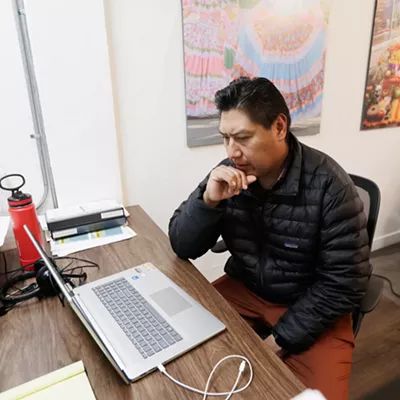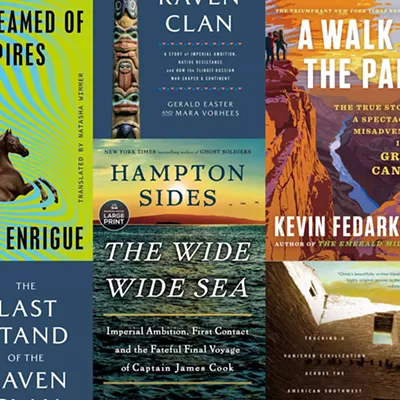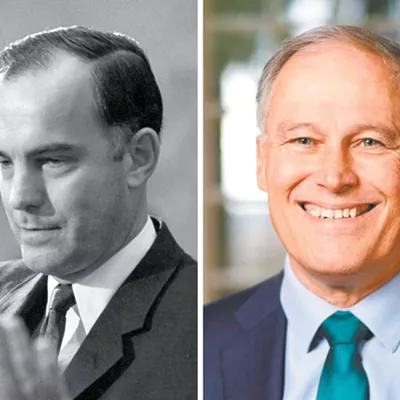
Cable news, social media, podcasts all bombard us with analysis about how we are becoming a more polarized, divided nation. Before writing this month's column, I wanted to see if that was borne out in how Spokane County voted in the congressional and U.S. Senate races.
In Spokane County, Democratic U.S. Sen. Patty Murray received about 44 percent of the vote in 2010 and about 45 percent this year, nearly the same percentage as 12 years ago. Republican Congresswoman Cathy McMorris Rodgers received about 56 percent of Spokane County's vote this year, compared with about 60 percent in 2010, down a bit, but her results two years ago were about the same as in 2010. I didn't see any sign of the increasing polarization we hear so much about, until I took a second look at the numbers.
In 2012, Murray outperformed the Democratic congressional candidate by 7,838 votes, and McMorris Rodgers outperformed the Republican U.S. Senate candidate by 8,929 votes. Those numbers suggest that 12 years ago in Spokane County there could have been roughly 7,800 to 8,900 independent swing voters. Even though there were about 40,000 more voters this year, it appears there were half as many independent swing voters. I'm guessing between 3,700 to 4,300.
I began wondering if this was another example of how we are becoming more polarized, so I decided to ask the expert. I called Mónica Guzmán, author of I Never Thought of It That Way, a New York Times staff-recommended read. Her book encourages people to lean into curiosity and listen. Guzmán, a Democrat, wrote the book after learning her parents voted for Donald Trump, and after trying to truly understand why and what they were thinking.
I caught up with Guzmán just as she was taking a holiday break from a national tour speaking to university, business and political audiences. She had the perspective I needed.
Guzmán explained that just because voting patterns tighten up does not necessarily mean people are more divided on issues than they were a few years before — it could be they just think they are. She explained there are two types of polarization. Ideological polarization is where policy differences divide groups. Then there is affective polarization, which is where people's feelings divide groups. Guzmán explained that she has encountered many examples of people being more affectively polarized than they were in years past.
That was the case with this past election in central Puget Sound. There, even though voters agreed with Republicans on inflation, crime, homelessness, new taxes and Olympia's unsustainable spending, they didn't vote for Republicans because they don't trust them. Voters weren't as ideologically polarized from Republicans as they were affectively polarized.
When we are affectively polarized, we imagine or suspect or believe what the other side thinks, and often we think "they" disagree with "us" more than they do. Projected differences generate anxiety that prompts judgment more than engagement, which devolves into a downward spiral. In politics, too often we base what "we" think "they" are thinking on signals from media sources; media sources that might have a profit incentive to keep everyone in a lather.
If that's where we are now, then the good news is maybe we aren't all that much more divided on issues than we were 12 years ago, but we think we are. I Never Thought of It That Way is a guidebook for getting beyond what we imagine the other side thinks and engaging in conversations that unlock the possibility of finding common ground.
All those who were just elected to office, need to be curious. Listen. Engage with those who disagree.
All of us, and certainly all those who were just elected to office, need to be curious. Listen. Engage with those who disagree.
All of us should heed the advice that Cecil Andrus, former Democratic governor of Idaho and President Jimmy Carter's secretary of the interior, gave me when I first ran for public office in 2007. Andrus wrote me endorsing my candidacy, then added:
"Work hard to avoid the partisanship that is poisoning our political process. Neither party nor one individual has all the right answers... We too often forget that the western United States was not built solely by 'rugged individualists' but by those willing to seek and find common ground even when that requires working together with political adversaries to achieve visionary goals."
As we head into the holiday season, let's all commit to engaging and working with those we disagree with. Let's quit grousing about how divided we are and quit demonizing the other side. Let's turn off cable news and stop reading political social media posts. Let's be curious and listen. We might discover we aren't as divided as the media keeps telling us we are. ♦
Bill Bryant, who served on the Seattle Port Commission from 2008-16, ran against Jay Inslee as the Republican nominee in the 2016 governor's race. He is chairman emeritus of the company BCI, is a founding board member of the Nisqually River Foundation and was appointed by Gov. Chris Gregoire to serve on the Puget Sound Partnership's Eco-Systems Board. He lives in Winthrop, Washington.























